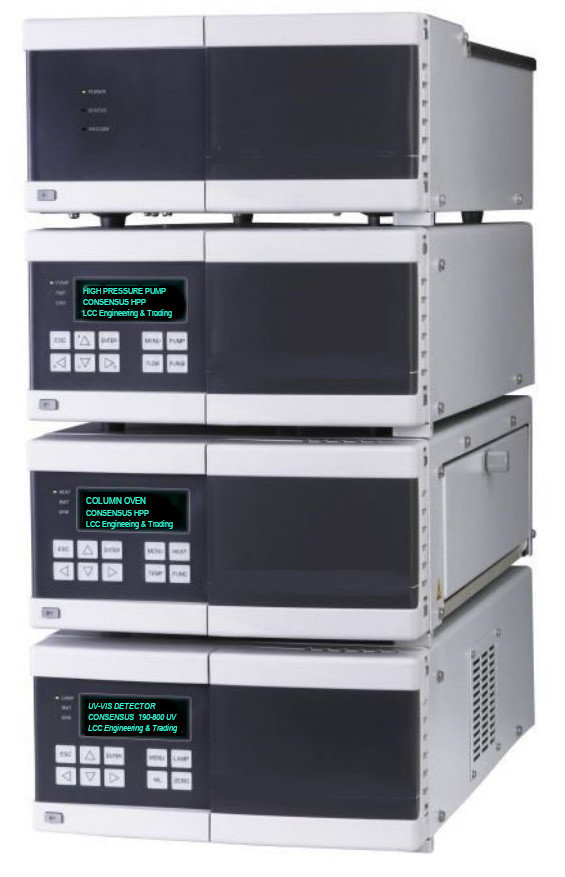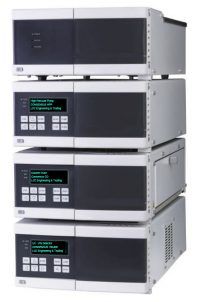The world is complex. We are here to help you!

Chromatographyshop.com is a division of LCC Engineering & Trading GmbH.
We are also part of the International Independent Chromatography Network (IICN) that provides unique specialties for chromatographers to improve job security and recognition. Quickly inform yourself about the benefits you gain by collaborating with IICN just click here
The fast way to solve problems, click the coloured links below
You just want to send us a message/request/order click here
Happy chromatographer Click here
Sample Preparation Techniques click here
Columns From Manufacturer names A to L click here
Imtakt for innovative HPLC Chromatography click here
Columns From manufacturer names M to Z click here
Low-Price HPLC/UPLC Systems click here
Chromatography Methods Library click here
High-Pressure Column Processes click here
Special Bed Chromatography click here
Chromatographyshop.com also for newcomers
Chomatographyshop.com also answers fundamental questions
Chromatographyshop.com explains the chromatographic methods!
Chromatography is a laboratory and production process for separating substance mixtures into individual parts. To understand this further, technical terms are used which are explained below.
A substance mixture is dissolved in a liquid, gas or supercritical fluid and called the mobile phase, which is pumped through the chromatographic system. This system consists of a substance injector, small particles or porous solid bed (in a column, cartridge, capillary tube, on a plate or porous film). That is called the stationary phase.
The different components of the mixture have different affinities for the stationary phase. The different molecules stay in the stationary phase longer or shorter depending on their interactions with their surface sites.
They move with different apparent velocities in the mobile phase, causing them to separate. The separation is based on the different partitioning between the mobile and the stationary phase. Slight differences in the partition coefficient of a compound lead to different retention in the stationary phase and thus influence the separation.
Chromatography can be done on a production, pilot, research or analytical scale. The purpose of production and pilot-scale chromatography is to isolate the components of the mixture for later use. Thus, it is a form of compound purification and isolation. A fraction collector is installed for this purpose.
Analytical chromatography is carried out using small amounts of the target material. It is used to determine the presence and type of molecules or to measure the relative proportions of analytes in a mixture.
Chromatographyshop.com offers production, preparative and analytical tools, components and systems including theoretical and application know-how.
Who are the Clients of Chromatphyhop.com?
Our clients are chromatographers, chemists, biochemists, chemical engineers, biologists, biotechnologists, forensic scientists, and entrepreneurs.
Chromatographyshop is constantly developing novel products, methods, and problem solutions for applications in the life sciences, food, and environment.
As a private Network organization, we represent many manufacturers of specialised products, instruments, and consumables. Many partner companies were founded by highly innovative and qualified scientists and entrepreneurs. We know them all personally.
Terminology and principles in Chromatographyshop.com
The Stationary Phase interacts with the individual molecules of the substance mixture and does not move. The residence of the analytes during their retention alternates between the mobile and stationary phase (random walk) and causes the substance characteristic retention time. In expanded bed adsorption chromatography, the stationary phase is in the fluidised bed. In Membrane Chromatography the stationary phase is a porous membrane.
Mobile Phase: In liquid chromatography (LC, HPLC, SFE/SFC) and thin-layer chromatography (TLC), the mobile phase comprises organic solvents, gases, or water. In the case of TLC, we speak of flow agents. In gas chromatography, carrier gases such as helium or hydrogen or nitrogen are used. In supercritical fluid chromatography, the mobile phase consists of CO2 and possibly co-solvent. The gas is liquefied under supercritical or subcritical conditions. Supercritical Fluid Chromatography is extremely versatile because it comprises Liquid and Gas Chromatography in the same process. The mobile phases differ in their elution capacity (“strength” see “Eluotropic series”), this causes different retention times and often also different selectivity.
Column: In chromatography, a column, or separation column, is a hollow tube with a diameter of a few micrometres to several meters. The length also varies from a few centimetres to 150 meters. In this tube, either the inner wall is coated (capillary column), or the column is filled with the stationary phase (packed column). The column does not have to be straight or vertical but can be rolled up like a tube.
Retention: Retention is the delayed flow of individual molecules of the substance mixture of the mobile phase through interaction with the stationary phase.
The retention of a substance by the stationary phase is essentially determined by three aspects:
- strength of interaction of the substance with the stationary phase (“tendency to remain in the stationary phase”).
- the boiling point of the substance (“tendency to remain in the mobile phase”)
- diffusion properties of the substance (“mobility in the stationary and mobile phase”).
In many cases, specific interaction of the substance to be analysed with the stationary phase is used to separate substances. The strength of the interactions between the sample components and the stationary phase is determined both by their structure and by their functional groups. In the case of non-polar substances, only dispersion interactions (Van der Waals bond) occur, while polar separation phases can also enter polar interactions, such as hydrogen bonds or donor-acceptor bonds. The latter separate according to the principle: opposites attract. This means that separation phases that can accept hydrogen for hydrogen bonding can separate substances that can provide hydrogen for bridge bonding (such as alcohol). Also, enantiomers, for example, which do not differ in their boiling points and would thus have the same retention times, can be separated by their differently strong interactions with special derivatives of cyclodextrins.
Retention time (tR): Is the total time required for an analyte to pass the column. This corresponds to the time between injection and detection of the analyte.
Deadtime (t0): is the time during which an analyte remains in the mobile phase without interacting with the stationary phase; thus, it corresponds to the time required for the mobile phase to pass through the column.
Net retention time or reduced retention time (tN): This is the difference between retention time and dead time. It, therefore, corresponds to the time during which an analyte remains in the stationary phase. tN = tR – t0
The flow time also called “dead time” indicates the time required for the mobile phase or a non-retained substance to travel through the chromatography apparatus from the injection via the column to the detector (see also flow volume). The flow time can be determined by injecting a non-retained substance (“inert substance”). This substance interacts with the stationary phase only to a very small extent.
It, therefore, passes through the apparatus at the same time as the mobile phase. The flow time is then identical to the time at which the peak appears in the detector.
The flow volume can be derived directly from the flow time. It results from the simple formula flow volume = flow of the mobile phase – flow time. The flow volume is very important for numerous calculations in high-performance liquid chromatography (HPLC), e.g., for method transfer between columns with different volumes.
Elution is the dissolving out or displacement of adsorbed substances from solid or liquid-soaked adsorbents and ion exchangers by continuous addition of a solvent (eluent = mobile phase). The solution flowing out of the separation column is called eluate.
This process is of particular importance in solid-phase extraction.
Chromatographyshop.com looks after your interests
We are a compact customer-focused manufacturing and service organization. And we are proud to have many loyal customers and highly skilled and competent technical partners all over the world!
Darwin once said: “It is not the financially powerful and professionally organized that will survive, but the agile ones that permanently adapt to the environment!”
Chromatographyshop.com is a private company, we consider our customers as part of the family. Many chromatographer send us their private e-mail so that we can submit them to companies that seek staff. Unfortunately, social networks have reduced people to commodities. Thus it is important to promote those who do not want to hide in anonymity.
For us, chromatography is a young science and process with many known and yet to be discovered properties and perspectives.
Over the many years, we have learned to separate very complex mixtures of large and small molecules and particles. We have empowered many specialists to analyse molecular interactions and reaction properties in many systems, e.g., bloodstream, urine, microbiome, water, wastewater, food, natural product discovery etc.
Chromatography is growing worldwide. Emerging countries have different needs than established countries. In many countries, there is no chromatography infrastructure yet. For many years, we are supplying customers in remote locations and smaller countries with all kinds of instruments and consumables quickly and cost-effectively.
Emerging countries need special help, Chromatographyshop.com is multicultural and knows those problems.
As a Swiss company, we are part of a neutral political and democratic system. Our customers may have different political, religious, ethnic and gender requirements. We appreciate that, but for us, you are our customers who have molecular separation/purification problems that require to be addressed. The priority for us is to help you fast with competitive solutions. We see our mandate as being neutral and focusing on resolving your problem efficiently and effectively.
In return, please communicate with us openly and truthfully so that we can realistically assess your problem. Everything we do is strictly confidential.
Chromatographyshop.com is keen to help you out of the post-Corona crisis
Dear young entrepreneurs and customers join us in the post-COVID era. We offer many new processes and strategies for you to pursue your own independent way.
Chromatographyshop.com has not been stopped by COVID19! Shopping with us is uncomplicated and reliable. Simply send us your list of requirements via the contact form or use our online shopping facility.
Availability of special products is difficult in some countries. Please explain your problems to us. We will find cost-effective solutions. Just send us your monthly or bi-monthly list of requirements.
Every crisis creates unemployment, and it changes the world. Such times are the best times to start a new business to grow and succeed in the new world. Nothing stands in the way of innovative and mobile chromatographed.
Just contact us for assistance!
Advanced Turnkey Systems &
Components
Supercritical CO2 Fluid Chromatography (analytical, Prep and Production scale) Is the most sustainable and productive technology. We offer the broadest range of choices ranging from single instrument to fully integrated cGMP analytical to large scale turnkey systems. Discuss with us the benefits of this technology.

-

“Can Do” Analytical System
Select options This product has multiple variants. The options may be chosen on the product page -

“Can Doo” Analytisches HPLC System
Select options This product has multiple variants. The options may be chosen on the product page -

“I know” Automatic Analytical System
Select options This product has multiple variants. The options may be chosen on the product page -

“I Know” Automatisches Chromatographie System
Select options This product has multiple variants. The options may be chosen on the product page -

“Moti-Watr” Chromatografie
Select options This product has multiple variants. The options may be chosen on the product page -

“Moti-Watr” Chromatography System
Select options This product has multiple variants. The options may be chosen on the product page -

ACE 10 & 15 C18-HL Biochromatography Column Range
Select options This product has multiple variants. The options may be chosen on the product page -

ACE 10 C18 Biochromatography Column Range
Select options This product has multiple variants. The options may be chosen on the product page -

ACE 10 C18 CLASSIC COLUMN RANGE
Select options This product has multiple variants. The options may be chosen on the product page
